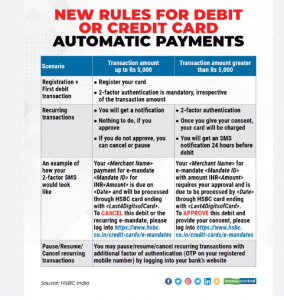Over the years, the behaviour on spending, saving and availing credit in India have undergone significant changes. Numerous factors have shaped these trends, which continue to evolve further – more stable income sources, rising disposable income, propensity to spend, availing credit opportunities for needs and many more. During this period, there has been a notable shift towards using credit cards as the preferred method for expenses and bill payments.
Credit card usage trends reveal immense potential for more effective usage, and people are often unaware of the effective strategies to maintain or improve their credit scores. A lack of attentiveness on their part may lead to difficult situations and unwarranted implications. Improper use of credit cards may lead to financial stress and debt. To make the most of their credit card while avoiding potential pitfalls, individuals may consider the following eight tips on how to use a credit card wisely.
1. Understand terms and conditions: Individuals should take the time to thoroughly understand the terms and conditions of the credit card agreement. For example, familiarizing with details such as interest rates, fees, grace periods, penalties and associated reward programs empowers individuals to plan well and make informed financial decisions. This knowledge becomes particularly valuable when creating a budget and planning debt repayment. Knowing the intricacies of the credit card agreement helps individuals anticipate potential costs and benefits, guiding them toward responsible financial choices. This is one of the key aspects when it comes to the question of how to use a credit card wisely.
2. Create a realistic budget: Effective credit card usage begins with a comprehensive budget plan. Individuals are encouraged to establish a budget that encompasses monthly income, fixed expenses, and discretionary spending. Allocating specific amounts for different categories ensures that credit card usage aligns with the budget. Regular reviews and adjustments are crucial, allowing individuals to adapt their financial plans as circumstances change. A well-crafted budget serves as a roadmap, preventing impulsive spending and promoting disciplined financial habits.
3. Paying the balance in full each month: Perhaps one of the most critical tips for using a credit card responsibly is to pay the balance in full every month. This practice prevents the accrual of interest charges, saving individuals money in the long run. If paying the full balance is not feasible, striving to pay more than the minimum amount due is advised. Failing to pay the total outstanding balance means incurring additional interest, essentially paying more than the principal. Emphasizing the importance of prompt and full repayment is essential to avoid unnecessary financial burdens. The Reserve Bank of India cautions borrowers in this aspect through a circular released back in 2015.
Source: HSBC India
4. Being mindful of the credit limit: The credit limit is not a target but a boundary. Individuals are urged to keep their credit card balance well below the limit. Maintaining a low credit utilization ratio positively impacts credit scores and reflects responsible credit management. Understanding this aspect of credit card usage helps individuals avoid potential credit score fluctuations and positions them favorably for future financial endeavors.
5. Avoiding cash withdrawals: Cash withdrawals on credit cards come with high fees and interest rates, making them an expensive option. Individuals are advised to manage expenses within budget and use the credit card preferably for payment transactions only. Reserving cash advances for genuine emergencies ensures that the cost associated with cash withdrawals is minimized, promoting more cost-effective financial practices.
6. Monitoring statements regularly: In considering the question of how to use a credit card wisely, cultivating the habit of regularly monitoring credit card statements is crucial. Checking for unauthorized transactions or errors and reporting them promptly safeguards against fraudulent activity. Additionally, regular reviews of statements help individuals stay informed about their spending patterns, making it easier to adhere to the budget. This proactive approach to financial oversight contributes to overall financial health.
7. Taking advantage of rewards responsibly: While credit cards offer enticing rewards programs, using them responsibly is paramount. Discouraging overspending or carrying a balance solely for the sake of earning rewards, individuals are advised to view rewards as a supplementary benefit for regular spending. By aligning reward usage with responsible financial habits, individuals can enjoy the perks without falling into the trap of unnecessary debt.
For example, a borrower owns a cashback credit card and strategically incorporates it into their routine spending, focusing on everyday expenses like groceries and gas. Rather than succumbing to the temptation of overspending for rewards, they align credit card usage with the established budget. They pay the credit card balance in full each month, avoiding interest charges and ensuring that the cashback benefits genuinely enhance their financial well-being. This approach exemplifies a balanced and disciplined use of credit card rewards, showcasing how individuals can maximize benefits without compromising financial responsibility.
8. Planning for large purchases: Individuals anticipating significant purchases are encouraged to plan meticulously. Understanding the impact on their budget and credit utilization is essential. Some credit cards offer promotional financing for large purchases, providing an interest-free period if paid in full by a specific date. Exploring these options and making informed decisions ensures that large purchases are integrated into the overall financial plan, preventing unexpected financial strain.
Consider X, who is planning a big purchase using credit card. In need of a new laptop, X assesses their budget, identifying a reasonable allocation for the purchase. They strategically select a credit card offering promotional financing for large purchases, providing an interest-free period. By understanding the terms and conditions, they proceed with the purchase, taking advantage of the interest-free period. Throughout this period, they conscientiously make payments, ensuring the complete repayment of the balance before the expiration date. This approach illustrates a responsible and strategic use of credit, allowing X to manage a substantial expense without incurring additional interest charges.
Recent developments around credit card usage
In a groundbreaking initiative, the Reserve Bank of India (RBI) introduced (in July 2023) a draft regulation that grants users of debit, credit, and prepaid cards the unprecedented ability to choose their preferred card network. This move signals a potential paradigm shift on a global scale, challenging the conventional practice where card network options are predetermined through agreements between issuers and networks. As outlined in a draft circular by the RBI, card issuers are now prohibited from entering into any arrangements or agreements with card networks that restrict them from availing of the services of other card networks. The primary beneficiaries of this innovative approach are customers, who will now have the freedom to choose their preferred card network at the time of issuance or even subsequently. This forward-looking regulation ensures that card issuers provide access to more than one card network, offering users a level of flexibility and choice previously unseen in the financial landscape.
In November 2023, the Reserve Bank of India (RBI) raised risk weights on consumer loans provided by banks, non-banking finance companies (NBFCs), and credit card providers, making lending in these sectors more expensive. Under the new rules, banks must now set aside 25% more capital for personal loans, increasing the reserve requirement from ₹8 to ₹10 for every ₹100 lent. The adjustment is expected to result in higher capital requirements for lenders, leading to elevated interest rates for borrowers. This move follows RBI Governor Shaktikanta Das’s concerns about the rapid growth in certain consumer loans, prompting increased surveillance and safeguards. The increased risk weights also apply to credit card receivables, impacting lending rates and potentially affecting borrowers with higher capital requirements and increased interest rates. The RBI’s action aims to encourage banks to base lending decisions on their credit assessments rather than relying on lending to NBFCs, reflecting a proactive approach to managing potential risks in the financial system.
If you are looking to transform your debt collections strategy with the power of digital and data powered insights, reach out to us to request an exploratory session at sales@credgenics.com or visit us at www.credgenics.com.
1. What are the key benefits of understanding credit card terms and conditions?
Understanding credit card terms and conditions is crucial, as it empowers individuals to make informed financial decisions. It helps in comprehending interest rates, fees, grace periods, and rewards programs, ensuring responsible credit card usage.
2. How does creating a realistic budget contribute to effective credit card usage?
A realistic budget serves as a foundation for responsible credit card usage by outlining monthly income, fixed expenses, and discretionary spending. It allocates specific amounts for different categories, preventing impulsive spending and promoting disciplined financial habits.
3. Why is paying the balance in full each month essential for wise credit card use?
Paying the balance in full every month is crucial to avoid accruing interest charges. By doing so, individuals save money in the long run and prevent the financial burden of paying more than the principal amount.
4. How does being mindful of the credit limit positively impact credit card usage?
Being mindful of the credit limit helps maintain a low credit utilization ratio, positively influencing credit scores. This responsible credit management reflects favorably on future financial endeavors.
5. What is the significance of monitoring credit card statements regularly?
Regularly monitoring credit card statements is essential for detecting unauthorized transactions or errors promptly. It also helps individuals stay informed about their spending patterns, facilitating adherence to their budget and contributing to overall financial health.
6. How to use a credit card wisely and for maximum benefit?
To use a credit card for maximum benefit, start by understanding the terms and conditions, selecting a card that suits your spending patterns, and paying the balance in full each month to avoid interest charges. Take advantage of rewards programs, strategically use promotions, and optimize your credit limit. By making informed choices and aligning your credit card usage with your financial goals, you can maximize the benefits, earn rewards, and potentially save money on your purchases while building a positive credit history.





